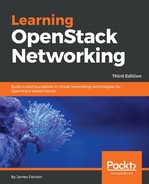As of the Pike release of the OpenStack client, BGP speaker-related commands are not yet available. The following neutron client commands are used to manage BGP speaker objects in the CLI:
|
BGP speaker management Commands |
Description |
|
bgp-dragent-list-hosting-speaker |
Lists dynamic routing agents hosting a BGP speaker. |
|
bgp-dragent-speaker-add |
Adds a BGP speaker to a dynamic routing agent. |
|
bgp-dragent-speaker-remove |
Removes a BGP speaker from a dynamic routing agent. |
|
bgp-peer-create |
Creates a BGP peer. |
|
bgp-peer-delete |
Deletes a BGP peer. |
|
bgp-peer-list |
List BGP peers. |
|
bgp-peer-show |
Shows information of a given BGP peer. |
|
bgp-peer-update |
Updates BGP peer information. |
|
bgp-speaker-advertiseroute-list |
Lists routes advertised by a given BGP speaker. |
|
bgp-speaker-create |
Creates a BGP speaker. |
|
bgp-speaker-delete |
Deletes a BGP speaker. |
|
bgp-speaker-list |
Lists BGP speakers. |
|
bgp-speaker-list-on-dragent |
Lists BGP speakers hosted by a dynamic routing agent. |
|
bgp-speaker-network-add |
Adds a network to the BGP speaker. |
|
bgp-speaker-network-remove |
Removes a network from the BGP speaker. |
|
bgp-speaker-peer-add |
Adds a peer to the BGP speaker. |
|
bgp-speaker-peer-remove |
Removes a peer from the BGP speaker. |
|
bgp-speaker-show |
Shows information of a given BGP speaker. |
|
bgp-speaker-update |
Updates BGP speaker information. |
Please refer to the upstream documentation on configuring address scopes and subnet pools for use with BGP dynamic routing. The following URL provides working examples that demonstrate BGP dynamic routing: https://docs.openstack.org/neutron/pike/admin/config-bgp-dynamic-routing.html.
